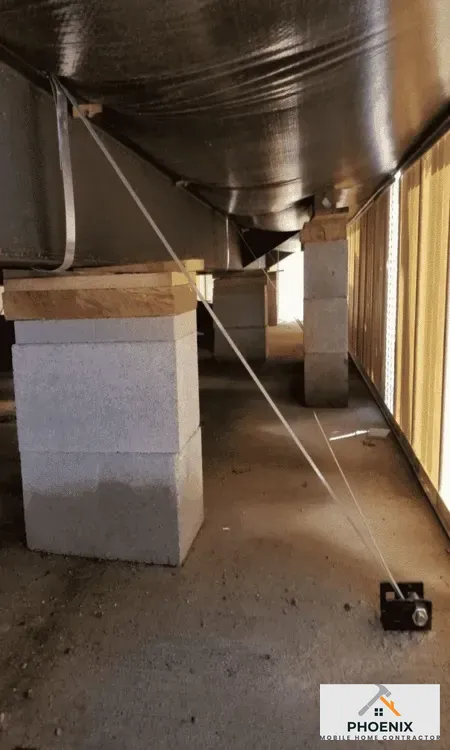When evaluating the cost to install mobile home tie downs in Phoenix, several local and technical factors shape the final bill. In most cases, mobile home tie down experts in Phoenix estimate installation costs to range from $2,500 to $5,500 depending on soil condition, number of required anchors, contractor choice, and local permit fees.
This range includes both the physical hardware—such as soil anchors, stabilizer plates, or over-the-top straps—and the labor charges associated with ensuring these meet the required specifications for wind and seismic safety. For a deeper overview of how tie down costs stack up nationally versus locally, visit this reputable guide from Manufactured Housing Institute.

What Factors That Drive Tie Down Installation Costs?
Key factors that drive tie-down installation costs include soil type, home size, and anchoring requirements. Mobile home tie-down pricing also depends on labor rates and material quality.
Arizona wind zone compliance costs affect safety and code adherence. For a deeper overview or to estimate your project, try this mobile home tie down cost calculator.
Type of Tie Down System
Different tie down systems come with different material and installation costs:
- Over-the-top anchors involve straps running over the home’s roof. These are often less costly in materials but can require additional bracing to prevent roof damage.
- Soil anchors and stabilizer plates are driven into the ground along the perimeter of the home. This method is widely used in Phoenix’s compacted, arid soil and provides robust lateral resistance.
- Concrete or slab-mounted systems are sometimes required in newer subdivisions or for double-wide manufactured homes. These systems command the highest prices due to excavation, formwork, and curing times.
Local Permit and Inspection Fees
In Maricopa County, homeowners typically need a mobile home installation permit, which may include separate inspection fees to verify that tie downs meet local and federal standards. Costs vary but generally add $300 to $500 to the total project. The county inspectors ensure that the installed system matches approved plans and meets HUD CFR 3285 guidelines for wind zone performance.
Site Preparation and Soil Considerations
Soil condition in the Phoenix area plays a significant role. Highly compacted caliche or rocky soil may require additional drilling or pre-treatment, increasing labor hours. Likewise, homes situated on older lots may need soil remediation or old anchor removal before new systems can be installed.
What are the Typical Cost Ranges for Arizona Homeowners?
Based on compiled contractor quotes, city fee schedules, and homeowner reports, the following estimates provide a realistic look at tie down installation costs in Arizona:
| Service | Low Estimate | High Estimate |
| Basic over-the-top strap system | $2,500 | $3,200 |
| Perimeter soil anchors with plates | $3,500 | $4,800 |
| Concrete or hybrid anchoring systems | $4,200 | $5,500+ |
| Maricopa permit & inspection fees | $300 | $500 |
These costs generally cover labor, materials, and local code compliance, but always request itemized bids to confirm. Some contractors in Phoenix also roll the permit handling into their contract, simplifying the process for homeowners.
When will Tie Down Costs Might Increase for trailer house?
Several factors tend to push costs toward the higher end:
- Older mobile homes (pre-1976) often require custom retrofit kits to satisfy HUD and local codes.
- Poor soil quality or underground obstructions increase labor costs.
- Multiple inspections or engineering approvals add consulting fees, especially on larger or multi-section homes.
- If the property needs grading, debris removal, or additional site leveling, these preparatory steps are typically billed separately.
Which are the Common Mistakes That Raise Tie Down Expense?
Homeowners in Phoenix often incur extra costs due to avoidable oversights. The most frequent mistakes include:
- Skipping soil evaluations. If installers arrive and discover rocky substrate or construction debris that impedes driving anchors, they must bring specialized equipment or adjust plans, increasing costs.
- Not pulling a proper permit. Work without permits may save money short-term, but fails to meet legal requirements. When homeowners later sell the property, non-permitted installations often require full replacement—at homeowner expense.
- Hiring general handymen. While cheaper upfront, many lack experience with the engineering specifics of HUD or Maricopa tie down standards. Failed inspections then require hiring a specialist to correct the work.
Frequently Asked Questions
How often should tie downs be inspected in Phoenix?
Mobile home tie downs in Apache Junction and Phoenix, AZ should be visually checked annually for signs of corrosion, loose connections, or disturbed soil. Although Maricopa County does not mandate annual inspections after initial approval, many homeowner insurance policies require regular documentation. Homeowners should especially schedule inspections after the monsoon season and watch for mobile home’s re-leveling warning signs, as shifting soils or pooling water can undermine anchor stability.
Are tie downs mandatory for all mobile homes in Maricopa County?
Yes. Both HUD CFR 3285 standards and local Maricopa County ordinances require that all manufactured homes be secured with approved tie down systems. This includes homes installed before modern HUD codes. Older homes often require retrofit kits to meet current standards when sold or relocated.
Can I install tie downs myself to save money?
Technically, homeowners can purchase tie down kits and attempt installation. However, in Maricopa County, work must still comply with code and pass inspection. Most DIY attempts fail initial inspection due to incorrect anchor depth, improper strap tension, or use of non-compliant hardware. Hiring licensed professionals ensures faster approvals and long-term structural safety.
The Bottom Line:
Tie down systems are more than regulatory paperwork; they are vital structural protections for manufactured homes in Phoenix’s arid, shifting soil environment. Ensuring your home is properly anchored shields against sudden storms and preserves property resale value by meeting stringent Maricopa County and HUD requirements.
